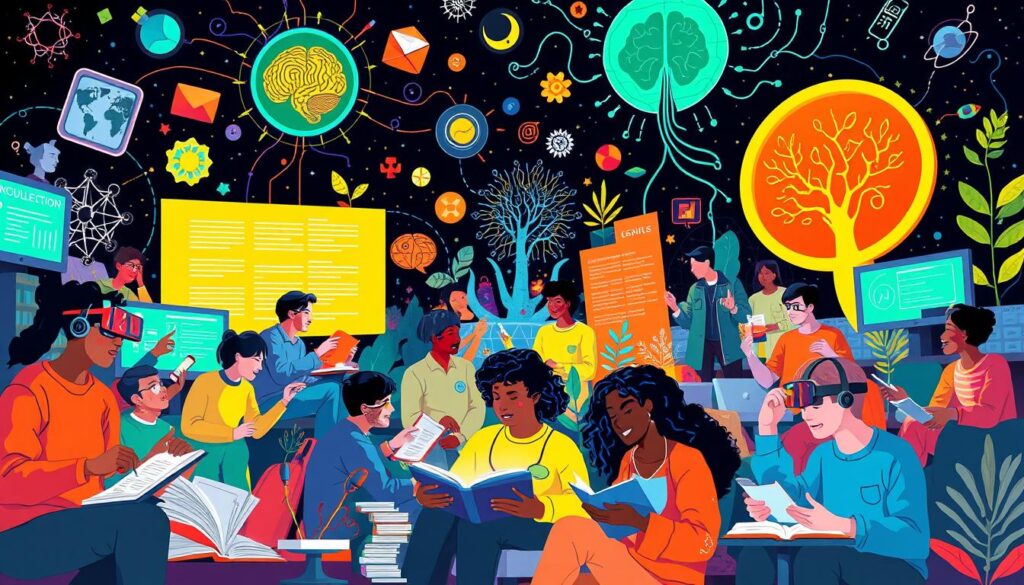In today’s fast-changing business world, AI is changing how we work. Leaders need skills that will last to keep up. They must learn to lead in an AI-driven workplace to ensure their companies succeed.
Leaders must look ahead and be ready for AI’s impact. By getting better at skills for the ai-driven workplace, they can lead their teams to success. This means creating a culture of adaptive leadership that helps everyone do their best.
We will look at key skills and strategies for leaders. They need to improve their emotional intelligence and make decisions based on data. They also need to keep learning and build diverse, inclusive teams. We’ll give you the tools and knowledge to lead in this new era.
Understanding the AI-Driven Workplace
The business world is changing fast, and AI is key to this change. The AI-driven workplace is where humans and machines work together. This teamwork boosts innovation and productivity. It’s changing how we see work, leadership, and company culture.
What is an AI-Driven Workplace?
An AI-driven workplace uses smart tech in many business areas. It automates tasks and helps people do better work. AI tools help employees focus on important tasks, making work smarter.
Key Features of AI Integration
AI in the workplace brings many benefits. It automates tasks, uses data to predict outcomes, and helps with decision-making. This lets people spend more time on creative work and teamwork with AI.
AI also helps leaders make better choices. It gives insights for big decisions, helping companies grow.
The Role of Leadership in AI Adoption
Leaders play a big part in making AI work in the workplace. They need to be open to new ideas and support teamwork with AI. Leaders should also train employees for an AI world.
With a clear plan and the right tools, leaders can lead their teams through change. This helps everyone grow and succeed together.
“The future of work is not about humans versus machines, but rather humans and machines working together to unlock new opportunities and drive innovation.”
Essential Skills for Modern Leaders
The role of leadership has grown more important in today’s AI-driven workplace. Leaders need a wide range of skills to lead their teams and organizations well. We’ll look at the key abilities needed for success in this changing world.
Emotional Intelligence in Leadership
Emotional intelligence is key for leaders. It means understanding and managing your own and others’ emotions. Leaders with high emotional intelligence can connect with their team, build strong relationships, and create a positive work environment.
This skill is vital in an AI-driven workplace. It helps leaders handle complex situations and motivate their teams.
Decision-Making in Complex Environments
The AI-driven workplace is full of fast changes and lots of data. Leaders need to make smart, strategic decisions. They should use data insights and think big to make choices that match their organization’s goals.
Encouraging Innovation and Creativity
Leaders today must have an innovation mindset. They should create a culture that values creativity and taking risks. This approach helps teams reach their full potential and keeps organizations adaptable in the AI-driven workplace.
The Importance of Adaptability
In today’s fast-changing world, being able to adapt is key for leaders. Adaptive leadership is vital for handling the AI-driven workplace’s challenges. Leaders who focus on strategic foresight and continuous learning can lead their organizations to success.
Embracing Change in Leadership
Good leaders know change is both inevitable and unpredictable. They are always ready to evolve and adapt. This means questioning old ways, trying new things, and learning from both wins and losses.
Strategies for Developing Flexibility
To be flexible, leaders need to grow, improve continuously, and empower their teams. Encouraging lifelong learning and offering chances to develop skills makes teams agile. This way, they can quickly respond to new trends and challenges.
Leading Teams Through Transitions
Helping teams through changes is a big part of adaptive leadership. Leaders must communicate well, offer emotional support, and keep teams productive and happy. With strategic foresight and a culture of continuous learning, leaders can help their teams succeed through change.
“Adaptability is not imitation. It means power of resistance and assimilation.”
– D.H. Lawrence
Fostering a Culture of Continuous Learning
In today’s fast-changing AI-driven workplace, being able to adapt and learn is key. Companies that focus on lifelong learning help their employees grow. They offer chances to learn and share knowledge, creating a space for both personal and professional growth.
The Value of Lifelong Learning
Learning continuously is good for both personal and professional development. It’s also crucial for companies to stay ahead in the skills for the ai-driven workplace. Workers who keep learning can handle the digital transformation better and bring new ideas to solve problems.
Providing Learning Opportunities
To build a culture of continuous learning, make learning easy for everyone. This means offering online courses, workshops, mentorship, or job swaps. By investing in our team’s growth, we help them stay updated with new tech.
Encouraging Knowledge Sharing
It’s also important to encourage sharing knowledge. This helps create a team that’s dynamic, innovative, and ready to adapt. By setting up places for sharing and praising those who help others grow, we boost our continuous learning culture.

“In a world of constant change, the ability to continuously learn and adapt is the most valuable skill an individual can possess.”
Building Diverse and Inclusive Teams
In today’s fast-changing AI world, diversity and inclusion are key. By working together with AI and improving emotional intelligence, we can use diverse views to spark new ideas and ethical AI.
Benefits of Diversity in the Workplace
Diverse teams offer a wide range of experiences and ideas. This mix boosts creativity, improves decision-making, and leads to better results for everyone. When people from different backgrounds work together, they find new solutions that help the whole team.
Strategies for Inclusive Leadership
Inclusive leaders know how important emotional intelligence is. They listen well, encourage open talk, and make sure everyone feels important. This creates a team that works well together and helps develop ethical AI.
Recruiting for Diversity
It’s vital to attract and keep diverse talent for top teams. By looking far and wide, working with community groups, and using inclusive hiring, we can find candidates with fresh views and skills. This effort not only prepares us for the AI future but also shows our dedication to ethical AI.
“Diversity is not just about checking a box; it’s about harnessing the collective power of different perspectives to drive innovation and create a more equitable future.”
Enhancing Communication Skills
In today’s fast-changing digital world, good communication is key for leaders. We need to connect well with our teams and partners. Learning to communicate clearly helps us build a culture of change, teamwork, and new ideas.
The Role of Effective Communication
Good communication is the base of great leadership. It helps us build trust and work together towards goals. It also makes sure everyone knows how to use technology for new ideas.
Techniques for Transparent Communication
We need to change how we talk to fit our team’s needs. This means listening well, giving feedback, and valuing different views. Being open to new ways of talking helps us reach out to everyone better.
Utilizing Technology for Better Engagement
New tools and tech have changed how we talk at work. Things like video calls and project tools help us work together smoothly. They make our workplace more lively and open to new ideas.

“Effective communication is the lifeblood of any successful organization. In an AI-driven workplace, our ability to navigate these technologies and foster a culture of transparency and collaboration will be key to driving innovation and staying ahead of the curve.”
Leveraging Data for Informed Decision-Making
In today’s AI-driven workplace, data is key for leaders to make smart decisions. We need to understand data literacy and strategic foresight to lead in the 21st century.
Understanding Data-Driven Leadership
Effective leaders in the AI-driven workplace know the value of data-driven decisions. They learn to analyze and interpret data to find insights. This helps them make strategic choices and grow their organizations.
Data literacy helps us spot patterns, predict trends, and prepare for challenges. It sets our teams up for success in the long run.
Tools and Technologies for Data Analysis
Many tools and technologies help with data-driven leadership. From data visualization software to predictive analytics platforms, these tools help us work with data. They let us collect, analyze, and understand data accurately.
By using AI and machine learning, we can fully use our data. This makes our decisions based on solid evidence.
Making Decisions Based on Insights
With data insights, we can make better, strategic decisions. These decisions help us reach our goals, whether it’s improving efficiency, finding new markets, or bettering customer experiences.
Data-driven insights give us confidence and clarity in the AI-driven workplace. By making decisions based on data, we can innovate, perform better, and succeed in the long term.
“In an age of artificial intelligence and machine learning, data literacy has become a critical skill for leaders who seek to thrive in the AI-driven workplace.”
Developing Strategic Thinking
In today’s AI-driven workplace, thinking strategically is key for leaders. Developing a strategic foresight mindset helps us tackle the complex landscape. It sets our organizations up for long-term success.
Importance of Big-Picture Thinking
Effective leaders see beyond today’s challenges and opportunities. Adaptive leadership means looking at the big picture. It helps us make decisions that fit our organization’s goals.
This way of thinking keeps us ahead. It lets us grab new innovation mindset chances.
Techniques for Strategic Planning
Strategic planning is crucial for strategic foresight. Using methods like scenario planning and SWOT analysis helps us create detailed plans. These plans guide us through the changing AI world.
They let us explore different futures and understand our strengths and weaknesses. This way, we can stay competitive.
Aligning Teams with Organizational Goals
Good adaptive leadership means aligning teams with the company’s vision. By sharing the company’s goals and empowering employees, we build a united team. This team is ready to face the AI-driven workplace’s challenges.

Ethical Leadership in an AI World
In today’s fast-changing world of artificial intelligence (AI), ethical leadership is key. We must think deeply about how AI affects us, our companies, and society. Ethical AI and emotional intelligence help us create a future where tech and humans work together smoothly.
Understanding AI Ethics
Ethical AI means making sure AI systems are honest, open, and answerable. It’s about dealing with big questions like privacy, data use, and AI’s impact on society. Leaders need to understand these issues and use AI ethically.
Navigating Ethical Dilemmas
Leaders in an AI world face tough choices that need careful thought and emotional smarts. They must balance different needs and stick to ethical rules. By talking openly and working together, we can solve these problems and make AI work for everyone.
Upholding Integrity and Trust
Being honest and trustworthy is crucial in an AI world. Leaders must be clear about AI use, its strengths and weaknesses, and how decisions are made. Showing a strong moral compass and ethical actions builds trust with everyone involved.
“Ethical leadership in an AI-driven world requires a delicate balance between embracing technological innovation and upholding the principles of integrity, transparency, and accountability.” – [Author’s name]
Preparing for Future Trends
As we move through the fast-changing world of AI in the workplace, leaders must stay ahead. They need to keep their skills sharp and their eyes on the future. Knowing what’s coming in AI and leadership helps us face challenges head-on.
Emerging Trends in AI and Leadership
AI is set to become even more part of our work lives. We’ll see big steps forward in talking computers, seeing computers, and smart decision-making. Leaders must keep up with these tech leaps and how they change our teams and jobs.
Also, more leaders will be needed who can handle and use AI well.
Anticipating Future Challenges
With AI everywhere, leaders will face tough choices and privacy issues. They’ll also have to deal with jobs changing or disappearing. It’s key to plan ahead and think about different scenarios.
Skills like always learning and being flexible will be vital for success.
Staying Ahead in a Rapidly Changing Landscape
To stay on top in the AI world, leaders must think ahead and keep learning. They should look for ways to grow, stay updated on trends, and work with AI experts. By embracing learning, leaders can lead their teams to success in the future.



